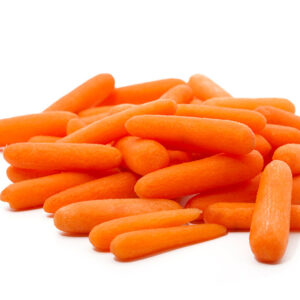
Dr. G’s Top 4 Foods to Save Your Eyes
Prevent cataracts and more!
When your vision takes a nosedive, so does your quality of life.
The bad news is that the older you get, the higher your chances are of developing a serious eye problem (like cataracts or age-related macular degeneration).
In fact, the leading cause of blindness—age-related macular degeneration—is expected to triple over the next 30 years.
That’s a BIG problem since vision problems can increase your risk of dying.
The good news is that there are steps you can take to reduce your risk of eye problems AND the deadly risks associated with them.
And it starts with THESE four foods.
A recent meta-analysis that looked at data on 48,000 people found that people with mild vision impairment had a 29 percent higher risk of mortality.
And those with serious vision impairment had an 89 percent increased risk of mortality.
That’s because vision impairment increases the risk of serious problems like falls, cognitive impairment, and even dementia.
Fortunately, maintaining your eyesight as you get older isn’t the luck of the draw. Studies indicate that four out of five cases of vision impairment can be prevented—or even corrected.
This is in part by wearing the proper glasses, and in part by having cataracts removed.
In addition, there are steps you can take to maintain your vision no matter how old you are. You can start by adding these four key foods into your diet.
Oranges
Oranges contain plant pigments called carotenoids that give them their orange color. These compounds can inhibit inflammation in your cells, a key underlying cause of eye problems.
Studies have shown that increasing your intake of carotenoids reduces your risk of age-related macular degeneration.
I prefer to eat oranges as opposed to drinking orange juice because the fiber slows the absorption of sugar into your bloodstream.
Red Bell Peppers
Like oranges, bell peppers are a good source of carotenoids. They also have high levels of vitamin C, with just one pepper containing 233 percent of the RDA of vitamin C!
That’s great when it comes to your eyesight, since studies have shown that high intake of vitamin C is associated with a reduced risk of cataracts.
Sweet Potatoes
Do you see a pattern here? Another food in the orange/red family are sweet potatoes. They’re a great source of beta-carotene, which your body then coverts to vitamin A.
Your body needs vitamin A to produce enough moisture and pigments for your retina to function properly. This is key for preventing dry eyes and night blindness.
Just one sweet potato will give you 100 percent of your daily requirement for vitamin A.
Salmon
Yes, another orange food has made the list. Salmon and other fatty fish are high in omega-3 fatty acids, which are key for the health of your retina.
Studies have found that omega-3s can help decrease the risk of macular degeneration, dry eyes, and glaucoma.
In fact, one study showed that people who ate oily fish like salmon just once a week had their risk of developing “wet” macular degeneration in HALF.
And while we’re talking about colors, the one color you should be avoiding is BLUE, especially at night.
The blue light that emits from devices like your TV and smart phone has been connected to an increased risk for eye strain, macular degeneration, and can cause retinal damage.
Written By Dr. Richard Gerhauser, M.D.
For years he’s been the trusted doctor for celebrities, world-class athletes, and countless seniors looking to reclaim their health.
And now…for the first time ever… he’s making his medical breakthroughs available to readers all across America.
Dr. Richard Gerhauser, M.D. is one of the most pioneering and innovative minds in medicine today – and he delivers cutting-edge cures each month through his Natural Health Response newsletter.
Natural Health Response readers get full access to Dr. Gerhauser’s protocols for chronic pain… heart disease… diabetes… Alzheimer’s… and even cancer. These are the very same treatments Dr. Gerhauser recommends to his own patients at his practice in Tucson, Arizona.
In addition to being a board-certified medical doctor, Dr. Gerhauser has earned two master’s degrees and has served as a clinical professor at the University of Arizona.
And as a physician at the world-famous Canyon Ranch, Dr. Gerhauser treated celebrities from around the world who paid dearly for the type of next-generation health information he provides Natural Health Response readers each month.
View More Free Articles
Mother Nature's Bone-Building Secret REVEALED
Mainstream medicine has peddled the same old song and dance about osteoporosis for years. Pop some calcium pills… do some jumping jacks… and cross your fingers that your bones don’t crumble like a stale cookie. But what if I told you Mother Nature has been hiding a bone-building secret right under our noses? And we […]
The INCREDIBLE Payoff for Delaying Diabetes
If you don’t know where your blood sugar levels stand, it’s time to get them checked. It’s estimated that one in three adults has prediabetes, yet 80 percent of these folks have NO IDEA they’re in this category. That’s a BIG problem because most people will develop type 2 diabetes within just five years of […]
The Biggest Dementia Risk Factor REVEALED
I’m sure you’re familiar with the Skeleton Dance song… “The foot bone is connected to the leg bone. The leg bone is connected to the knee bone…” It’s easy to think of our bones being linked because we can physically see them. What’s less obvious is that everything else about your health is JUST as […]
It's NEVER Too Late to Kick This Dangerous Habit
You’ve heard it a million times before: “Smoking is bad for you.” If you’re still lighting up, I bet you remember a time when smoking wasn’t just accepted—it was downright fashionable. Remember when you could smoke in restaurants, on airplanes, and even in hospitals? Heck, movie stars even made it look cool and sophisticated. Well, […]
The TRUTH About ED No One's Talking About
It’s a subject most men would rather sweep under the rug… erectile dysfunction (ED). But you’re not alone if you’re having trouble in the bedroom. In fact, ED affects up to 30 million men in the U.S. alone. However, popping a little blue pill isn’t the answer. ED drugs are often just slapping a Band-Aid […]
Don’t Let Muscle Loss RUIN Your Golden Years
For older women, muscle mass can take a nosedive after menopause. This means more than trouble carrying in the groceries. Over time, the decline in muscle mass can lead to mobility problems, balance problems, falls, and ultimately a loss of independence. Staying active is a critical piece of the puzzle. But now, researchers have discovered […]
The Bad Habit Causing Lupus
All autoimmune diseases are on the rise—but lupus is one of the worst. When the condition strikes, your immune system starts to attack healthy tissues. Lupus cases have increased by 60 percent in women and have increased six-fold in men over the past four decades. What’s driving this dramatic increase? Well, we might have found […]
SHOCKING Missing Piece of the Diabetes Puzzle Discovered
I’ve been saying for years that there’s MORE to type 2 diabetes than your weight—or even your diet. Sure, they play their part. But unless you’re adding in THIS missing piece of the puzzle, you could be increasing your risk of type 2 diabetes despite your best efforts to avoid it. And you’ll never guess […]
Ditch the Chips and DEFY Aging
Sometimes, you just want something to crunch on. The craving can send even the most health-conscious among us heading straight to the snack aisle. But before you reach for the potato chips—which can contain all kinds of harmful ingredients—I have a better idea. Try THIS crunchy, healthy snack instead of loading up ingredients that can […]
Is Aspirin DEADLY? (Get the Truth Here)
Old habits die hard… especially when we’ve been led to believe they’re good ones. We were told for years that taking an aspirin a day would lower the risk of heart attack and stroke. But for many, those were empty promises that came with a LOT of risk… and LITTLE reward. That’s why, if you’re […]










